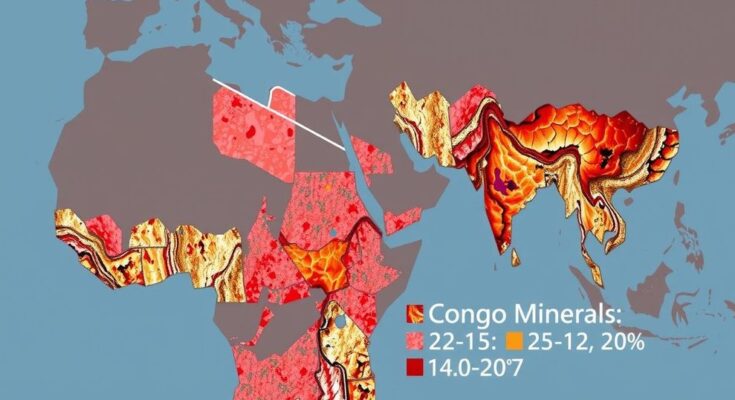A UN report has revealed that rebels in eastern DRC illegally exported 150 metric tons of coltan to Rwanda, contaminating the region’s mineral supply chain. The M23 rebel group seized control of Rubaya and established a monopoly on coltan exports, complicating procurement for technology companies. Legal actions against Apple highlight the repercussions of using conflict minerals, emphasizing the need for ethical sourcing in the tech industry.
A recent report by UN experts has revealed serious concerns about the contamination of the mineral supply chain in the Great Lakes Region due to illegal exports of coltan by rebels in the eastern Democratic Republic of Congo (DRC). Last year, at least 150 metric tons of coltan were illicitly exported to Rwanda, significantly impacting the integrity of minerals that are critical for technology manufacturing. The movement of minerals from the Rubaya region, controlled by the M23 rebel group, has created a significant mix between Rwandan and Congolese mineral production, leading to unprecedented contamination levels.
The M23 Rwandan-backed group seized the Rubaya area after intense conflicts in April, allowing them to establish control over key transport routes essential for the mineral trade. This control has formed a monopoly for exporting coltan from Rubaya to Rwanda, generating significant financial revenue for the rebels—reportedly around $800,000 per month. Furthermore, the rebels have doubled the wages of local diggers to maintain productivity and have enforced strict control over the mining operations, including the imposition of forced labor to expand transport infrastructure.
As a result of these developments, procuring conflict-free minerals has become increasingly challenging for technology manufacturers. Companies are under pressure to ensure that their supply chains do not include materials sourced from conflict zones such as eastern Congo. This scrutiny is compounded by legal actions, including a criminal complaint filed by the Congolese government against Apple subsidiaries in France and Belgium, accusing them of utilizing conflict minerals. Although Apple has contested these allegations, it highlights the significant implications that the activities of armed groups have on global supply chains and the responsibilities of large corporations.
The situation in the eastern Democratic Republic of Congo has been complex, historically characterized by armed conflict, particularly involving various militia groups seeking control over valuable mineral resources. Coltan, essential for the production of electronics, has been a key target for such groups due to its significant market demand. The armed conflict in the region has perpetuated illegal mining and export practices, leading to widespread international concern over the sourcing of conflict minerals and their impact on global supply chains for technology manufacturers.
In summary, the report underscores a severe crisis where the M23 rebel group in the DRC is undermining international norms concerning responsible mineral sourcing. Their control over coltan exports has not only contaminated the supply chain but has also raised ethical concerns for technology companies that are increasingly held accountable for their mineral sourcing practices. Moreover, continued monitoring and action are essential to address these challenges and restore integrity to the mineral markets in the Great Lakes Region.
Original Source: www.mining.com




